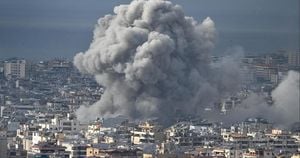The 29th UN Climate Change Conference, or COP29, recently concluded in Baku, Azerbaijan, leaving many feeling disheartened and questioning the effectiveness of international climate negotiations. Dubbed the "Climate Finance COP," this summit was intended to address how vulnerable nations would be supported financially to combat climate change's devastating impacts. Unfortunately, the promises made fell far short of what experts deem necessary.
Over the course of the summit, negotiators from various nations worked tirelessly, but by the end, they had only pledged $300 billion annually by the year 2035 to assist countries most affected by climate change. This figure is vastly inadequate when considering experts' estimates indicating over $1.3 trillion is needed annually to genuinely address and alleviate the needs of these vulnerable populations. The situation is particularly pressing as many developing countries came to the conference advocating for $500 billion each year—not as loans but as grants to help them cope with the multi-faceted challenges posed by the climate crisis.
Mohamed Ali, Chair of the African Group of Negotiators, addressed the reality of the negotiations with pragmatic recognition of the limitations inherent to this multilateral process. "While not all aspirations are fully reflected, these commitments are not acts of charity. They are acts of survival, shared prosperity, and solidarity," Ali stated, invoking the African principle of Ubuntu. His assertion drew attention to the interconnectedness of humanity, emphasizing, "When Africa loses, the world loses. When Africa thrives, the world thrives." His speech signified the call for nations to transcend divisions for the greater good.
Yet, unity among vulnerable nations proved fragile. Tensions arose when Nigeria's delegation suggested reclassifying China and India—a stance traditionally adhered to by wealthier nations—as developed countries. This decision raised eyebrows and illustrated the potential fractures within the Global South, hampering the cohesive front negotiating for climate aid.
Far from emphasizing collaboration, the summit was also marred by distressing controversies, particularly the overwhelming presence of fossil fuel lobbyists. Their numbers significantly outweighed country delegations, with executives from major oil corporations, including Aramco and BP, actively participating. Critics were vocal, dubbing the conference as nothing more than a "fossil fuel lobbyist’s playground," particularly after Saudi Arabia expounded its firm opposition to phasing out fossil fuels entirely. Instead of focusing on reducing reliance on fossil fuels, discussions leaned toward carbon markets and geoengineering, topics diverging from the momentum gained at COP28.
Conversely, clarity emerged from contributions by China, which signaled greater transparency on climate finance and expressed willingness to engage voluntarily with the Global South. The European Union tried to bridge the gaps between differing factions, yet efforts were muddled by wealthier nations' hesitance to commit more substantial contributions.
Looking forward, Brazilian President Luiz the leader of COP29, marked COP30 as the "turnaround COP." Scheduled to take place next year in Belém, Brazil, negotiations will prioritize moving away from fossil fuels and safeguarding forests. Simon Stiell, the head of UNFCCC, characterized the modest $300 billion as "an insurance policy for humanity," urging for prompt commitment acknowledgment. Still, many feel let down. Jiwoh Abdulai, Sierra Leone’s Minister of Environment, encapsulated sentiments of disappointment by declaring, "This deal is too little, too late. Vulnerable nations will continue to bear the brunt of inaction."
The dissatisfaction echoing through the halls of Baku highlights the urgent need for accountability and genuine action. Developing nations, already on the frontline of the climate crisis, will not remain silent as they continue to negate the effects of the decisions made, or rather, those left unmade.
Among the dramatic moments during negotiations was the walkout staged by delegates from developing nations. They expressed overwhelming frustration with the proposals on the table, which they found insulting. These included the last official draft presented before the walkout which allocated $250 billion annually by 2035, double the previous decade's goal but still below the $1 trillion estimate required by experts.
During this pivotal moment, Mohamed Adow, from Power Shift Africa, conveyed the atmosphere of desperation echoing through the now-abandoned meeting rooms, stating, "They don’t feel heard. They feel excluded from the talks, and that's why they decided to suspend the meeting." This walkout was emblematic of the deep-rooted frustrations felt by poorer nations who often feel their voices are minimized amid the complex web of negotiations.
Although COP29 reached its dramatic conclusion, with some sort of agreement, it was hard to ignore the sentiment prevalent among many negotiators and activists. While last-minute efforts at negotiation managed to yield some semblance of consensus—as the delayed discussions culminated early Sunday morning—the reported commitments still left devastated advocates and environmentalists wondering if the time for real action had passed.
Many activists voiced their dissent loudly, such as Lidy Nacpil from the Asian Peoples’ Movement on Debt and Development. After the announced proposals, she challenged the perception of developing countries as mere recipients of aid, sharply saying, "We are not beggars!" Her comments were underscored by the collectivity of activists and civil society representatives, who spoke out against dismissive proposals, indicating their solidarity with voicing their demands for more meaningful contributions from wealthier nations.
Repeatedly, COP29 served as another reminder of how intertwined the issues of climate finance, responsibility, and equity are. With the climate crisis worsening and protests reverbering louder, especially from those most affected, the path to COP30 looks rocky, albeit necessary. Whether the needs of vulnerable nations will finally be met remains to be seen, but with each negotiation, the call for action grows stronger. The reality and urgency of the climate crisis remain on the forefront of global discourse, yet the question remains: Will the next summit deliver what is needed?



